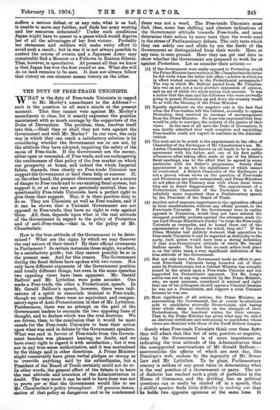TOPICS OF THE DAY.
THE WAR 'WAR has come, as it was bound to do. Two Powers V V or two people cannot both want the same thing so much that neither will give way without ultimately appealing to the only arbitrament, war. In these circumstances, it does not seem to us material to discuss which side was to blame for the actual outbreak of hostilities. The Japanese could not be expected to wait for ever for the Russian reply, and the Russians could not be expected to lose any advantage that procrasti- nation might give them in regard to the passing of the cold weather. What concerns Englishmen now that the war has begun is its probable result. Clearly the first British interest to be considered is—" How are we to keep out of it ? " The nation does not want another war, and a war which must almost certainly set the whole world on fire. But it is clear that, con- sidering our obligations, the risk of our being involved is much less if Japan wins than if she loses. Should Japan be beaten, and her existence as a State seriously imperilled or even weakened, it would be difficult for us to resist an appeal from her for assibtance, either direct or indirect. On the other hand, if Japan beats Russia, or holds her own, there will be no need, and indeed no excuse, for her to appeal to Britain. She will prefer to keep that complete control of her own policy which independent action gives her. Prudent people, then, what- ever they may think of the ultimate effect of Japanese dominance in the Far East, should such dominance ever come into existence, cannot but hope that Japan will be the victor, or at any rate will not be beaten. There will be no immediate embarrassment for us in Japanese successes ; there must be in Russian victories.
If we look beyond this immediate, and, so to speak, personal, aspect of the case, and try to consider the more general aspects of the war, one fact stands out with special boldness. It is obvious that, whichever way the contest goes, China will be the prize of victory. The Powers may make what stipulations they will as to Chinese neutrality and integrity and as to the "open door," but domination in China in some form or other will belong to the conqueror. That is, the winning State will control Pekin, and its influence will be potent over Chinese affairs and policy. A very little reflection will show that this must be the case, and that China, as we have said, is the ultimate prize that is being fought for. Let us take Russia first. If Russia wins, she will be un- disputed mistress of Manchuria, and also of Korea ; and though she may not alter her nominal status in either place, she will have a complete ascendency within them. She may allow the presence of Consuls, and may say she will respect treaty rights ; but she will be supreme in both cases. But such complete control over Manchuria, and the prestige of her victory, admitted that it is achieved—a very large admission, considering the events of the past week—will make Russia the dominant Power at Pekin. China would never stand up to a victorious Power so near her,—a Power whose strength had been exhibited with such tremendous effect at her very doors. Next take the more likely event of a Japanese victory. If Japan wins—that is, if she takes Korea and drives Russia out of Manchuria and occupies it herself—is it to be supposed that she will not begin to use the great latent force of China in order to secure the fruits of victory and to recompense herself for her outlay ? To blame her for such action would be absurd, for it would be her only path of safety. Besides, it would mean the fulfil- ment of her very natural ambition to lead the yellow race, and to show the world that she is capable of regenerating Asia. Because Japan had taken Korea and occupied Manchuria she would not, of course, try to annex half 'China, but unquestionably we should begin to see the hand of Japan at work throughout the Empire. Japan would drill the Chinese troops, Japan would reorganise the Chinese Army, and Japanese officials would reform the Chinese finances. In their hearts the Chinese may not like the Japanese ; but the prestige of the vanquishers of Russia would be irresistible, and, at any rate, Chinese pride would be soothed by the fact that they were being "run," not by a Western and European Power, but by Asiatics who understood them and their ways. We shall be told, no doubt, that Europe would not allow the Japanese exploitation of China ; but at what point would Europe intervene in the silent, gradual, and almost secret process that we are contemplating? Besides, could Europe agree ? Britain, for example, could not turn upon her ally in the moment of her victory, and without our assistance the rest of Europe would hardly care to face a great naval campaign against the Japanese Fleet,—the only Fleet in the world manned by veterans, and in possession of all the strong places in the Far East. We may feel pretty sure, then, that anything like a complete victory for Japan will mean that the Japanese will gradually begin to obtain the position in China, or at any rate in Northern China, which we obtained in India. Her local control of the sea will give her the same advantages that Admiral Watson's naval success gave us in India. No one who is not prepared to wrest the command of the sea in the Far East from Japan will be able to say her nay. Whether such a condition of things will be in the interest of Britain we do not propose to consider in detail at the present moment ; but it is well for us to remember that a Japan dominating a rejuvenated China, or even a rejuvenated North China, might prove a far more formidable rival, commercial and political, than Russia. No doubt it would take Japan many years— possibly two generations—to reach the position in Asia that we have outlined, but the tendency towards such development is none the less one which we must take into account.
Our readers will possibly say that it remains to be seen whether Japan will win in the struggle in which she is now engaged, and that therefore any misgivings as to the effects of her dominance over China or in Asia generally are premature. That it is much too soon to assume that Japan will be the victor we agree. There is at present nothing more than a possibility, and against that possi- bility we must place the fact that Russia cannot afford to be beaten. By this we mean that Russia, in order to maintain her prestige in the world, will be forced to strain every effort to beat Japan. Even, then, if Japan wins the first round, which—again, we may point out, is not yet certain—Russia will be obliged to go doggedly on. She will doubtless say to herself, as we said to ourselves during the Boer War : "We must see the war through and through to ultimate victory, even if it costs us ..t500,000,000 and lasts five years." But if Russia determines—and the Russians are a very determined, if not a very efficient, people—to fight in this spirit, will she not finally wear down the opposition of the Japanese just as we wore down the opposition of the Boors? We shall not attempt to say whether she will or will not, but we must point out that the analogy is not nearly so close as it looks at first sight. We talk of Japan as a small Power, but that is only a fashion of speech. After all, Japan has forty millions of people, and wearing down a State of that size is very different from wearing down one of a million,— we count the Cape Dutch with the Boers. Again, Japan is apparently going to obtain the local command of the sea. It is possible, then, that Russia might pour her legions into Manchuria for four or five years, and yet pour them in vain. Russia's nominal force is, we admit, immense; but can she apply it where she will want it ? It is no good to have four millions of armed men if she can only manage to keep a moderate-sized army in the field in Manchuria. The big battalions are only useful when they are big at a particular place.
There remain two other speculative points of interest at the present juncture. If Russia is beaten, can she afford to stay beaten ? Must she not instantly begin preparing for another war ? One would think she must. But if this is the case, the Japanese will realise it, and will, before they make peace, endeavour to get some guarantee against future Russian action. What guarantee can they get ? They cannot hope to push Russia any further back than out of Manchuria ; but behind the Amur Russia can make all her preparations. Lastly, we may consider the possi- bility that neither side will win, but that both will be exhausted. Japan may win completely at sea, and may then invade Manchuria with her troops, and at first she may be victorious. But suppose she is then drawn on to penetrate, say, into the Amur provinces, and finally suffers a serious defeat, or at any rate, what is as bad, is unable to move any further, and finds her army wasting and her resources exhausted ? Under such conditions Japan might have to assent to a peace which would deprive her of all the advantages of her first victory. Probably her statesmen and soldiers will make every effort to avoid such a result; but in war it is not always possible to control the course of events, and a Japanese Army may conceivably find a Moscow or a Pultowa in Eastern Siberia. That, however, is speculative. At present all that we know is that Japan has won the first round at sea. What she will do on land remains to be seen. It does not always follow that victory on one element means victory on the Other.







































 Previous page
Previous page